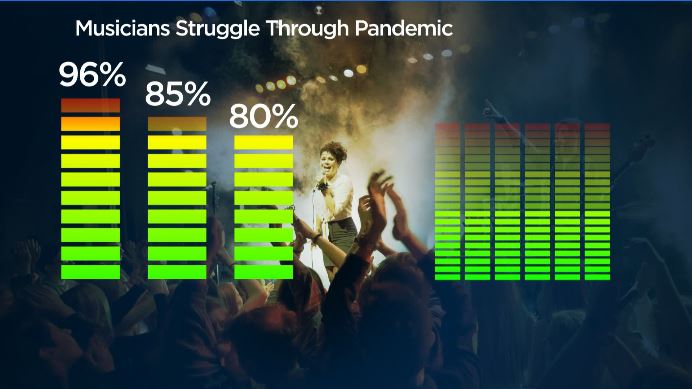Music artists are expressing concern about the uncertainty surrounding when they’ll get to perform in front of an audience again.

And they say a lack of government support is making life difficult for most people in the industry.
“Everything is uncertain,” says Renee Couture and Johnny Fox with the Standstills.
“We have to sit with the idea that it’s going to be a lot different than what we’re used to,” says Fox.
The last time they played in front of a live audience was before the pandemic, in March. Not being able to play live gigs at the moment is a huge impact to their bottom line.
“Realistically, live touring is where musicians make the most money,” says Couture.
Renee and Fox hail from Oshawa and formed the band more than 10 years ago. They say although times are tough now, so was the time of Napster, when artists fought for their music rights.
“This is a huge challenge, but so was illegal downloading and streaming,” says Fox. “We’re putting so much into something that we have to give away for free.
“So it’s just another big challenge trying to play for people.”
- Toronto Stock Exchange plunges due to massive precious metals sell-off
- Bombardier warns of ‘significant impact’ to travellers from Trump’s threat
- Can Trump decertify aircraft? What experts say amid Bombardier threat
- Stepfather of two missing N.S. kids charged with sexual assault of adult, forcible confinement
That goes for local musician Kevin Comeau as well. He’s a guitarist in the band Crown Lands and says it’s hard being left in the dark in terms of what’s next.
“I think that’s the worst part, is not knowing,” says Comeau. “Every day there is something new. This year should have been much bigger for us.
“We should have been touring the world, supporting our debut record.”
This comes after a popular music venue shut its doors in Oshawa back in June, another blow to the music scene as the pandemic slowly made its mark on the industry. Several others have since been impacted, as well.

Get breaking National news
And as we head into a possible second wave of the pandemic and the reopening of music venues is far off the horizon, it’s unclear to artists what the next step is. Experts say artists big and small are in a bind and unsure how to get out.
“A lot of musicians are in super dire straits,” says Alan Cross, a music journalist with 102.1 The Edge, a Corus station.
“It is a cascading effect that is going down the entire music industry,” he says.
Cross, who is the host of The Ongoing History of New Music, says it’s not just the artists but other jobs in the industry that are affected, too.
“It’s their crews, it’s the people who rent the instruments, the production assistants,” he says. And even though some may think bigger artists will be okay, he says, the lack of live shows presents a struggle for them, too.
“Even top artists are relying solely on royalty checks or performing rights cheques,” he says. “There is no level of the music industry that hasn’t been affected by COVID-19.”
The uncertainty is echoed in this survey done by Music Canada, an advocate for music and those who create it.

In that survey, 96 per cent of respondents say their income has been affected negatively.
Eighty-five per cent say without live performances, it’s hard to make a living.
And on top of that, more than 80 per cent say they feel disconnected from the music community, negatively impacting their work.
“There is a lot of worry and a lot of musicians are wondering whether or not they continue with their chosen career choice,” says Patrick Rogers, the co-interim CEO for Music Canada.
It’s a problem the province says it’s aware of and has given funding to the arts. Earlier this year, a relief fund called Musictogether was created. Musicians have access to a $300,000 relief fund, half of which came from the provincial government.
This gives artists the chance to apply for one-time performance fees of $1,000 for livestreaming at home shows, as well as the ability to take donations and sell merchandise.
Some artists are also eligible for the Canadian Emergency Relief Benefit, but the concern is when that runs out.
“This is the point where it could get scary,” says Couture with The Standstills.
“We have a sound engineer who is currently working in a hardware store,” she says. “How can you tell someone that has been doing this their whole life they need to get a job?”
Rogers with Music Counts says with the end of CERB approaching, it’s their hope governments band together to help the industry with some sort of other initiative.

“That’s the continuation of CERB or the program that the prime minister has talked about in terms of gig economy workers,” says Rogers. “Those sound good and Music Canada will be there to help.”
Artists say that in addition to lost income, they also just miss the environment of live events.
“That’s some of our favourite moments of getting to do these things is getting to know a lot of people in the background.”
For now, several musicians are connecting with their audiences online.
And Renee and Johnny, who are currently recording an album, are encouraging fellow musicians to keep going.
“Stay focused, stay positive and try and make incredible music. Just try to let go of the things you can’t control,” says the duo.









Comments